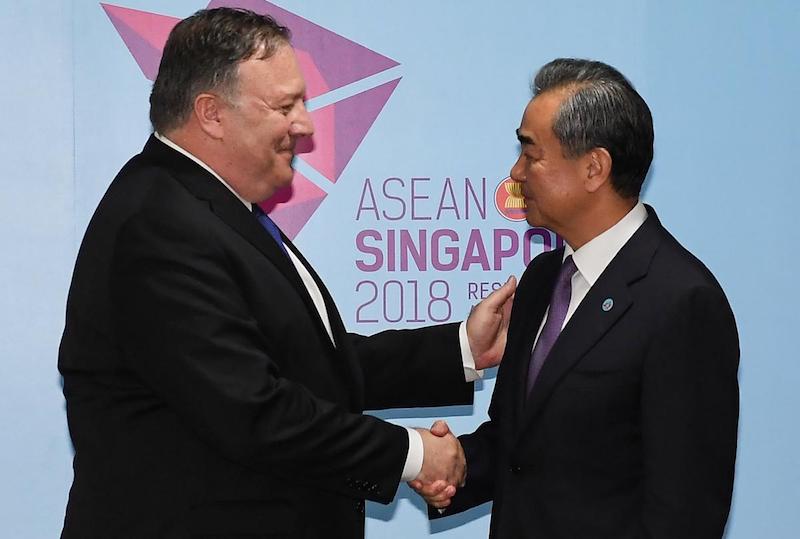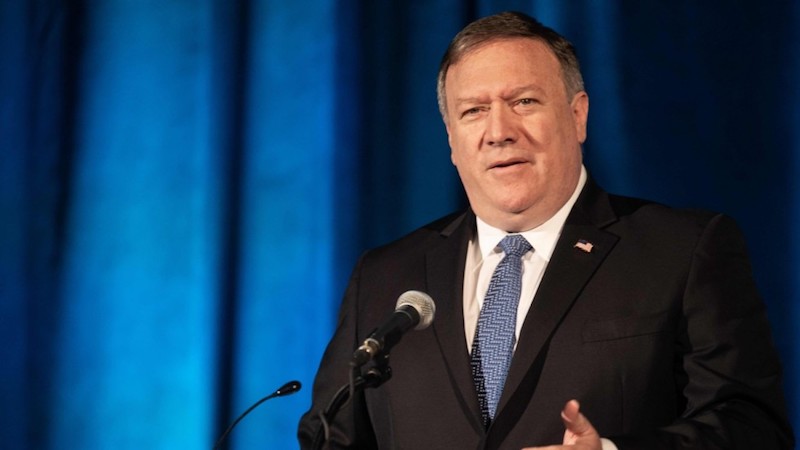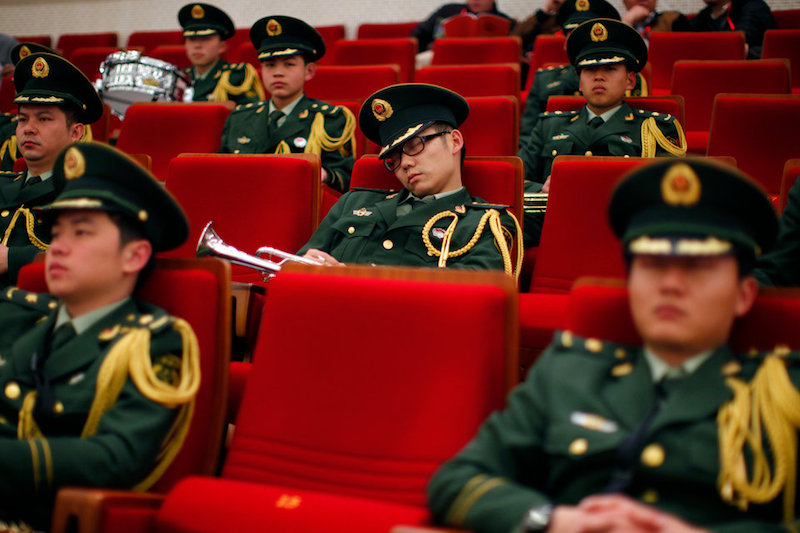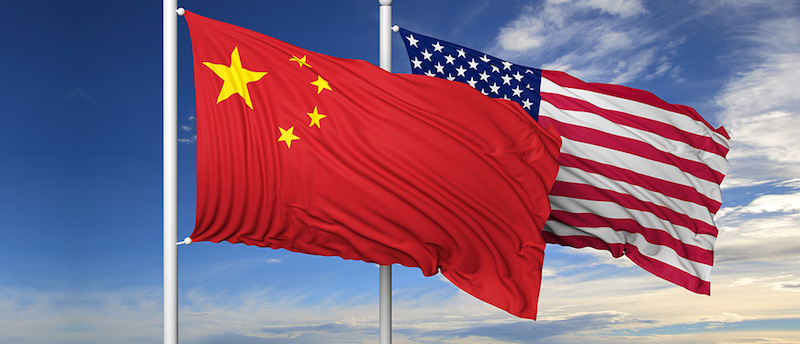
 Tentative Signs of U.S.-China Cooperation at the ASEAN Summit
Tentative Signs of U.S.-China Cooperation at the ASEAN SummitAt the ASEAN summit in Singapore this week, attendees showed tentative signs of cooperation on a number of issues, including the South China Sea and the China-U.S. relationship.
On Friday, U.S. Secretary of State Mike Pompeo met with Chinese Foreign Minister Wang Yi on the sidelines of the summit. Speaking to reporters after the meeting, Wang said that China is willing to resolve differences with the U.S. on a principle of equal footing, a sentiment which he said the U.S. secretary responded positively to. According to Wang, Pompeo told him he was "was willing to maintain constructive contact" and "does not want current frictions to continue," although the trade war was not mentioned specifically.
The content of the two leaders' conversation has not yet been reported officially by the U.S. government, but State Department spokesperson Heather Nauert said in a statement that "Secretary Pompeo underscored the importance of pursuing a constructive U.S.-China relationship that produces meaningful results," CBS reported on Friday.
However, formal negotiations between the two powers over trade have not yet been announced, and do not appear to be imminent. On Friday, the Chinese Ministry of Commerce announced it would apply tariffs on $60 billion a year worth of imports from the U.S., at rates ranging from 5% to 25%, if the Trump administration goes ahead with plans to place further tariffs on Chinese imports.
Further news out of the ASEAN summit came on Thursday, when it was announced that China and the ASEAN nations had come to an agreement on the draft text for a code of conduct (COC) governing behavior in the South China Sea, after over a decade of talks. This single draft negotiating text will become the basis for future negotiations between China and the ASEAN nations, signalling a positive step on a issue that has long been a sticking point, as China-US Focus contributor Richard Heydarian illustrated in an article last year.
 U.S. Authorizes New Strategies in the Indo-Pacific
U.S. Authorizes New Strategies in the Indo-PacificOn Wednesday, the U.S. Senate passed the 2018 National Defense Authorization Act, an annual piece of legislation that authorizes large sections of defense funding for the American military for the upcoming year. In line with strategy documents passed last year, the act passed this week has been interpreted as another sign of a realignment of U.S. policy towards viewing China as a strategic competitor.
Writing on the topic this week, China-US Focus contributor Lucio Blanco Pitlo argued, "The decades-old U.S. policy of accommodation toward China is giving way to greater pushback against Beijing's advances." In line with this interpretation of U.S. policy, the unclassified summary of the act states: "China is leveraging military modernization, influence operations, and predatory economics to coerce neighboring countries to reorder the Indo-Pacific region to their advantage."
A spokesman for the Chinese Embassy in Washington noted that passage of the law could cause further damage to the mutual trust between the two countries, saying, "We urge the U.S. side to discard the outdated cold-war and zero-sum mentality."
In addition to the passage of the National Defense Authorization Act, U.S. Secretary of State Mike Pompeo announced on Monday in a speech to the U.S. Chamber of Commerce that the U.S. will invest nearly $113 million in technology, energy, and infrastructure projects in the Indo-Pacific. "These funds represent just a down payment on a new era in U.S. economic commitment to peace and prosperity in the Indo-Pacific region," Pompeo said. Australia and Japan have announced that they will join the U.S. in these projects.
While Chinese officials noted they would be open to working with all parties to increase connectivity, foreign ministry spokesman Geng Shuang said that he hoped that "these countries can offer some real money and real measures to improve regional connectivity and help with the development of countries in the region."
 President Xi Orders PLA To Cease Commercial Activities
President Xi Orders PLA To Cease Commercial ActivitiesOn Wednesday this week, the Chinese government marked 'China's People's Liberation Army Day' — the 91st anniversary of the founding of China's military — with a new directive banning the military's involvement in commercial activities. As part of his campaign to reduce corruption in the military, on the eve of PLA Day, President Xi Jinping instructed the military to end its involvement in side businesses and paid services like "kindergarten education, publishing services, and real estate rentals" by the end of the year.
These changes come at a time when the Chinese government's policies for the armed forces are under increased scrutiny. In June, PLA veterans staged a rally in Zhenjiang, Jiangsu province to call for increased veteran's benefits and "better rights," one of a number of demonstrations in recent years. As an attempt to address complaints, in March, the central government set up a new ministry called the Ministry of Veterans Affairs.
The South China Morning Post reported that the Ministry of Veterans Affairs has drafted a new law in an attempt to better serve veterans' interests, but many observers are concerned that the legislation will not effectively address the root causes of the problems. Details of the draft have not yet been released.
 This Week's Top Commentary
This Week's Top CommentaryIn recent months, American officials have pointed to intellectual property theft, the trade deficit and restrictions on foreign investment in China as rationale for applying tariffs on Chinese goods. In a commentary this week, China-US Focus contributor Mei Qichu addresses these three points in turn, arguing that they are misconceptions.
"Average Americans have benefited from trade with China," Mei writes, "It is true, the U.S. has been running a big trade deficit with China. It can be argued at the same time that American families have enjoyed cheap yet quality Chinese products and the entire country has been able to keep an ultra-low inflation rate over the years. Statistics show that every American household saves more than $800 on average every year because of China-US trade."
Prepared by China-US Focus editorial teams in Hong Kong and New York, this weekly newsletter offers you snap shots of latest trends and developments emerging from China every week, while adding a dose of historical perspective.
- 2018-07-27 President Trump’s Trade War Bailout
- 2018-07-20 Xi Charms the World
- 2018-07-13 China Defends WTO Record in the Face of Additional U.S. Tariffs
- 2018-07-06 The Trade War Begins
- 2018-06-29 President Trump Chooses Slightly Softer Option on Chinese Investment
- 2018-06-22 Trade Tensions Spark Stock Sell-Off in China
- 2018-06-14 How “Comprehensive” Is the Kim-Trump Agreement?
- 2018-06-08 China Awards Putin First Medal of Friendship
- 2018-06-01 USPACOM Rebranded As U.S. Indo-Pacific Command
- 2018-05-25 Trump Cancels North Korea Meeting
- 2018-05-18 The On/Off Trump-Kim Summit
- 2018-05-11 American Goods Are Stuck at Chinese Ports
- 2018-05-04 China and the U.S. Lay Trade Demands on the Table
- 2018-04-27 U.S. Delegation Will Visit China Next Week
- 2018-04-20 China and the U.S. Seek Allies in Trade Dispute
- 2018-04-13 President Xi Reviews the PLA Navy
- 2018-04-06 China and Russia Pledge Military Cooperation in a Signal to the United States
- 2018-03-30 Kim Jong Un Visits Beijing on First Overseas Visit
- 2018-03-23 President Trump Asks for Tariffs on Around $50 Billion Worth of Chinese Imports
- 2018-03-16 Tillerson to be Replaced by Mike Pompeo as Secretary of State
